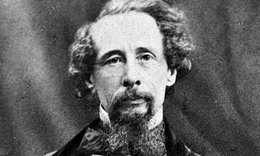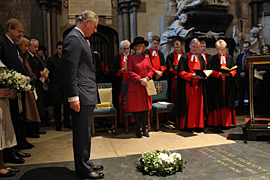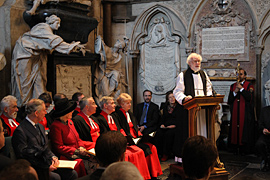Archbishop's address at wreath laying ceremony for Charles Dickens

Tuesday 7th February 2012
The Archbishop of Canterbury, Dr Rowan Williams, delivered an address at a wreath laying ceremony at Westminster Abbey to commemorate the 200th anniversary of the birth of Charles Dickens.The ceremony included readings by Mark Dickens, the great-great-grandson of Charles Dickens, biographer Claire Tomalin and actor Ralph Fiennes, who read a passage from Bleak House.
 Prince Charles laid a wreath on the author's grave in Poets' Corner, where he was buried in 1870.
Prince Charles laid a wreath on the author's grave in Poets' Corner, where he was buried in 1870.
In his address, Dr Rowan Williams praised Dickens' ability to get to the heart of the human condition.
The Archbishop said: “It is difficult to tell the truth about human beings. Every novelist knows this in a special way, and when Dickens sets out to tell the truth about human beings, he does it outrageously by exaggeration, by caricature”.
“The figures we remember most readily from his works are the great grotesques. We think we have never met anyone like them - and then we think again.”
 The Archbishop said Dickens “writes about people and hell, and he knows what hell is like”.
The Archbishop said Dickens “writes about people and hell, and he knows what hell is like”.
He added: “He loves the poor and destitute. Not from a sense of duty, but from a sense of outrage that their lives are being made flat and dead”.
"He wants them to live. He wants them to expand into the space that should be available for human beings to be what God meant them to be."
The congregation at the Abbey included the largest ever gathering of Dickens’ descendants, as well as representatives from the worlds of literature, film, theatre and the media including film director Mike Newell and actress Gillian Anderson.
The full text of the Archbishop’s address can be found below.
Archbishop of Canterbury's address at the Wreathlaying Ceremony to mark the bicentenary of the birth of Charles Dickens, Westminster Abbey, 7 February 2012
It's difficult to tell the truth about human beings. Every novelist knows this in a special way, and when Dickens sets out to tell the truth about human beings he does it outrageously, by exaggeration, by caricature. The figures we remember most readily from his works are the great grotesques. We have, we think, never met anyone like them; and then we think again.
The truth is extreme, the truth is excessive. The truth about human beings is more grotesque and bizarre than we can imagine. And Dickens' generous embrace of human beings does not arise out of a chilly sense of what is due to them, but out of a celebratory feeling that there is always more to be discovered. Even his villains are exuberant. It was George Orwell who pointed out that when Mr Murdstone sets David Copperfield one of those appalling sums in his unhappy childhood, it is couched in terms of calculating numbers of Double Gloucester cheeses. Orwell points out that a real Murdstone would never have thought of the cheeses: it's part of that overflow, that unnecessary, excessive sense of what is human that takes us from page to page in Dickens, eyebrows raised and breath bated.
Dickens is the enemy not so much of an unjust view of human beings, as of a boring view of human beings. He loves the poor and the destitute, not from a sense of duty but from a sense of outrage that their lives are being made flat and dead. He wants them to live. He wants them to expand into the space that should be available for human beings to be what God meant them to be. In Hard Times, he left us, of course, one of the most unforgettable pictures of what education looks like if it forgets that exuberance and excess, and treats human beings as small containers for information and skill.
And that sense of the grotesque is, strange as it may sound to say it, one of the things that makes Dickens a great religious writer. As we've heard [in an earlier reading from The Life of Our Lord] he could write simply and movingly about Christ. He could, in A Christmas Carol, leave us one of the greatest modern myths arising out of the Christian story. But he had relatively little time for conventional religion, and no time at all for those who substituted conventional religion for that exuberant celebration of the human which he was interested in. 'Mr Chadband he wos a prayin wunst at Mr Sangsby's and I heerd him, but he sounded as if he wos a speakin' to hisself, and not to me. He prayed a lot, but I couldn't make out nothink on it.' [Extract from Bleak House] The Chadbans and the Jellybys and all those other (again, I'm afraid) unforgettably exuberant hypocrites in his books – these are the people on whom at the end of the day, he wishes judgement to be passed.
But that sense of excess in the human spirit and the human heart also leads on to another side of Dickens—equally serious, equally religious, much more disturbing—that side of Dickens which makes him indeed a novelist to stand alongside the very greatest imaginative spirits in Europe; and this is Dickens' sense of the tragic. Dickens writes about people in hell, and he knows what hell is like. He describes people in the hell of deceit and self-deceit – William Dorrit, Mr Merdle, Lady Dedlock: people who cannot live, literally, when their myths about themselves are destroyed. Because part of this sense of exuberance in Dickens is the recognition that all of us live by projecting myths and dramas about ourselves. We tell stories about ourselves, we write scripts for ourselves, and we love to act them out.
But what happens when those stories and those scripts are so far from reality that we cannot actually survive the touch of truth? Tragedy in Dickens is so often about that appalling moment when a myth is shattered, and a person with it. And along with the hell of deceit and of self-deceit, there are the hells of obsession – of Mr Monks and Miss Havisham, Mrs Clennam and Bradley Headstone, people who have lost all their freedom, and for once are losing their exuberance because they have been taken prisoner by something in themselves, locking them in, weighing them down. They are part of Dickens' unparalleled portraiture of self-destruction. And perhaps these depictions of hell—the hells of self-deceit and obsession and self-destruction—owed something to Dickens' own painful self-awareness: a man who recognised the gap in his own life so often between aspiration and reality; a man who in his own exuberance drove himself towards self-destruction – and yet in that very process (again as we have heard today) drew out extraordinary levels of sheer joy, festive celebratory hearing of what he had to say.
A man, then, who portrays human beings excessively and extravagantly. A man who portrays human beings in hell. And yet when we read him, it does not read like bad news. What does he have to say at the end of the day about redemption? In some ways not a great deal. Or rather there is a tension again and again in his books between a carefully, neatly resolved happy ending, and an immense burden of recognised, almost unbearable, unresolved suffering. He achieves the balance of those two most perfectly, for one reader, in Bleak House, where the past tense of Esther's narrative is balanced by the present tense of unhealed suffering, the rain still falling on the Lincolnshire wolds. But in that book, which one reader at least thinks is perhaps his most profoundly theological—though he wouldn't thank me for that—we have one of the strangest, most shocking images that he ever gives us of compassion and mercy, and that is the figure of Sir Leicester Dedlock. At the very end of Bleak House, left alone in his decaying mansion, holding open the possibility of forgiveness and restoration, 'I revoke no dispositions I have made in her favour', says Sir Leicester, with his typical dryness, about the wife who has fled from him in guilt and terror. And in that appallingly stiff phrase we hear something of the hope of mercy. Almost silent, powerless, Sir Leicester after his stroke, dying slowly in loneliness, and stubbornly holding open the possibility that there might be, once again, love and harmony.
'We may confidently hope that God will forgive us our sins and mistakes, and enable us to live and die in Peace', says Dickens for his children [The Life of Our Lord]. And perhaps for us as grown-ups (or people who might quite like to be grown-ups one day) that image of the hope of God's forgiveness is shockingly, startlingly expressed in that lonely figure stubbornly holding the door open, revoking no dispositions made in our favour. Powerless to enforce love or justice, and yet indestructibly, even extravagantly, offering the only kind of love that is appropriate to the extravagant and excessive nature of human beings. An utterly unreasonable compassion, which because of its utter unreasonableness can change everything.
© Rowan Williams 2012
